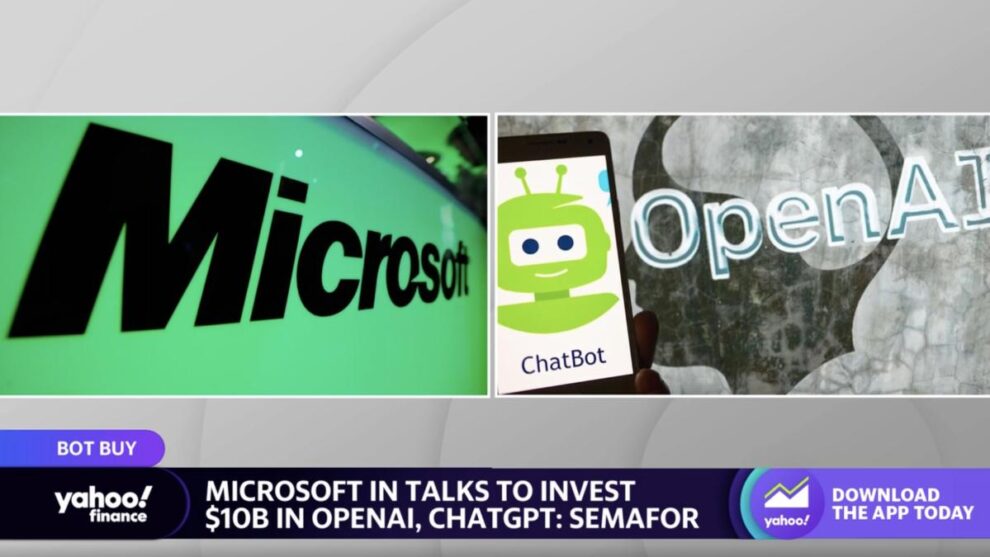Semafor Business & Finance Editor Liz Hoffman joins Yahoo Finance Live to weigh in on Microsoft’s $10 billion investment in ChatGPT-owner OpenAI.
Video Transcript
– Treasury Secretary Janet Yellen will be staying in her role. Bloomberg reporting that in mid-December, President Biden asked Yellen to remain in her post. There has been speculation that Yellen would leave her position following midterms. Yellen is likely to be a key figure in the administration, and Republicans are forced to battle over the raising debt ceiling. So Janet Yellen, Bloomberg reporting, staying in her role. Dave.
– Stability, very good. Microsoft meanwhile reportedly investing a whopping $10 billion in students’ favorite homework killer, ChatGPT. Let’s talk about that with the reporter that broke the story, Semafor’s Liz Hoffman. Liz, good to see you. Tell us what you know about this investment. And effectively, will Microsoft become the owner of ChatGPT?
LIZ HOFFMAN: Yeah, thanks for having me. It’s good to be here. I do think the right way to think about this is an M&A deal. I mean, $10 billion is just magnitudes larger than any venture– single venture investment that we’ve seen. And so at the end, it’s a complicated deal. We can talk a little about that, if you want. But Microsoft will end up owning about half of this company and really sees it as just an incredibly important strategic bet on the future of technology.
– Liz, let’s talk about the details of that deal because it is a little complicated, just in terms of how much money they’re getting over the number of years, and a lot of that tied to performance.
LIZ HOFFMAN: Yeah. I should say, we don’t know everything. We don’t know what we don’t know, and Microsoft has declined to comment on this. But it would be phased in over a number of years. It also might include Microsoft had done an earlier investment in OpenAI in the form of credits because the biggest cost– I mean, really the massive amount of money that ChatGPT spends, it spends on cloud computing.
Because every time, to your point, a student tries to get an essay written by a chat bot, or just like you and me, who have found this incredibly fun and addicting, it costs the company, like, $0.02 every time someone uses it. So they’re just bleeding money in server costs. So there is some serious cash coming in. But for them, cloud credits are almost as good.
And Microsoft, too, is really buying market share for its cloud business, which is the number two behind Amazon. But that’s an incredibly competitive business between Amazon, Google, and Microsoft. And a lot of these big companies who have a ton of cash have actually been using it to make investments.
I remember a couple of years ago, Google put a billion dollars into CME, the exchange, as part of that. They were going to move, basically, a lot of their cloud computing needs to Google. So it’s strategic in a bunch of different ways fir Microsoft.
– You mentioned that ChatGPT is bleeding money, in your words, on OpenAI, on ChatGPT. Is there plans to start charging for those transactions that you mentioned? I’m always surprised that I’m on there and it’s not charging me. If not, what are the practical applications to begin profiting from this technology?
LIZ HOFFMAN: Yeah. I mean, that’s always the problem with early stage companies. At some point, they need to figure out how to monetize. These guys have done an incredibly good job winning the attention game, and so they need to figure out how to flip that switch. The answer is there’s a ton of applications. I mean, first of all, Microsoft plans to use this in their software.
We’ve made a lot of clippy jokes in the last 12 hours, but they were very early to that game. Like, I see you’re trying to do this. Can I help you? OpenAI, the code is so good, it can help people figure out how to do stuff in Excel. So it can really make sort of technical software that Microsoft sells just a lot easier and more user friendly, which will help them.
But I’ve also talked to CEOs at unrelated nontech companies who think this can be a game changer for customer service, for client relationship management, that kind of stuff. I mean, just think about how much of Twitter is just people standing in line at the airport and tweeting angrily at Delta. So there’s a lot of– there are a lot of applications.
And the one we haven’t talked about, obviously, is search. Microsoft’s Bing has been really an afterthought to Google for a long time. Interestingly, Google is very good. If you ask it a question, it will come back very reliably with– and point you to where you can find an answer. It’s not that good at telling you the answer. It’s trying to get better at that, and you’ll see some of their search results are a little more kind of natural language-y, but they’re kind of clunky. And so people really think this could be the future of search.
– You know, Liz, I’m curious just to get your personal take on this because Morgan Stanley was out with a note last month talking about– or, I guess, discussing more so how big of a threat ChatGPT could potentially be for Google and its search business. From what you know, from all the reporting that you’ve done, do you think it’s going to move the needle there?
LIZ HOFFMAN: I’ll say two things. One is this is a little bit like we’ve all been promised flying cars. And here we are, and we don’t have them. This does feel like the next big thing in tech, right? You had the internet in the late ’90s. You had mobile in the late 2000s, and kind of nothing since then. So just at a high level, I think this is really directionally interesting.
But then the verdict from the market today, I don’t know exactly where they are right now, but Microsoft opened about a point up, and Google opened about a point down. And that’s $35 billion of market value just swung between two tech giants. And by the way, it’s not often you see investors in a company like Microsoft cheer them putting a huge amount of money into a very nascent technology at an incredibly high price point. So clearly the market thinks this is a game changer and is happy that Microsoft is getting there first.
– Liz, we haven’t heard anything in the way of competition. Have you? And what is stopping someone else from getting in this game? It doesn’t seem like there would be a massive hurdle or barrier to entry.
LIZ HOFFMAN: That’s always the problem with venture, right? How deep is the moat, and how big a head start do you have. I guess it really depends on– there’s a couple of things, right? Is computing power now a commodity? Maybe. You could probably argue that it is. You’ve got the big players.
The cost of cloud is always coming down. If you had enough time to feed the entire history of human interaction into a powerful enough computer, and you had enough money, I don’t see why someone couldn’t replicate this. I think that’s a real concern here. That said, head starts are really helpful, and they have a very big one.
– It’ll be fascinating to see where this technology takes us. Liz Hoffman, always great to have you, of Semafor. Thanks so much.






